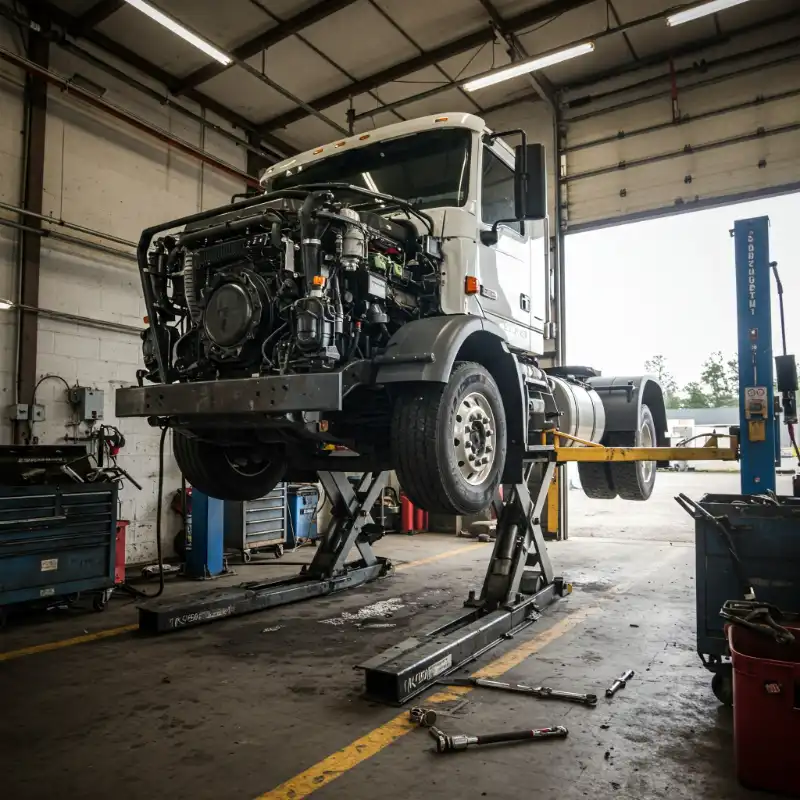Rust doesn't just ruin the look of your truck, but it can also compromise the structural integrity of both the body and the frame. We’ll break down how to prevent and repair rust on your truck.
Understanding the Threat of Rust
Rust is essentially iron oxide, which forms when metal (particularly steel) comes into contact with oxygen and moisture. Over time, rust can spread, leading to brittle metal that flakes away. This process can be especially damaging to truck frames, which carry heavy loads and endure a lot of stress. If left unchecked, rust can compromise both safety and performance.
Steps to Prevent Rust on Your Truck
Prevention is always better (and cheaper) than a cure. Here’s how to stop rust from taking hold in the first place.
1. Regular Washing and Waxing
Let’s be honest, after a long haul, the last thing you want to do is wash your rig. But giving your truck a regular bath is crucial, especially in areas where salt and grime build-up. Salt is a fast track to rust as it accelerates the corrosion process. Make sure to pay special attention to the undercarriage, wheel wells, and frame, where moisture and dirt collect.
After washing, apply a wax coat to the paint, which creates a protective barrier against moisture. A good waxing doesn’t just keep your truck shiny; it helps to repel water.
2. Apply Undercoating
Undercoating is one of the best defenses for your truck’s frame. This involves spraying a protective coating on the chassis, fender wells, and undercarriage. These specialized coatings are usually made from wax or rubberized compounds, forming a seal that prevents water, salt, and other corrosive elements from making direct contact with the metal.
Reapply undercoating as needed, especially if you notice chips or cracks forming over time.
3. Regular Inspections
Catch rust early, and you’ll save yourself a ton of time and money. Regularly inspect your truck’s frame and body panels for early signs of rust. Key areas to check include the door sills, frame joints, and underbody where dirt can accumulate.
If you spot rust, act immediately before it spreads. A small rust spot is much easier to repair than dealing with a large corroded section of the frame.
4. Keep Drain Holes Clear
Your truck likely has small drain holes in the doors and along the frame designed to allow water to escape. When these get clogged with debris, water can accumulate inside the body panels and lead to rust. Make it a habit to clear these holes, especially after driving through mud or heavy rain.
Repairing Rust on Your Truck’s Frame and Body
No matter how vigilant you are, rust can still find a way onto your truck. If it does, here’s how to fix it before it becomes a real problem.
Surface Rust Treatment
Surface rust is the first stage of corrosion, appearing as orange or brownish spots on the metal. It’s relatively easy to treat if caught early.
- Step 1: Sand the area with grit sandpaper (use 80-120 grit to start) until the rust is removed and you’re back to clean metal.
- Step 2: Apply a rust converter, a chemical that turns residual rust into a black, inert surface.
- Step 3: Prime the area using a high-quality rust-inhibiting primer.
- Step 4: Paint over the primed area with automotive paint or truck bedliner spray for extra protection.
Scale Rust Repair
Scale rust occurs when rust penetrates deeper into the metal, causing it to flake and pit. At this point, the metal has lost some of its strength.
- Step 1: Use a wire brush or grinder to remove all flaking metal. You need to get back to solid, non-corroded steel.
- Step 2: Follow up with a rust converter to stabilize any leftover rust.
- Step 3: Apply a body filler for small pits or holes. Sand the filler smooth once dry.
- Step 4: Apply primer and paint or a heavy-duty coating like POR-15, which is specifically designed for rusted areas.
Penetrating Rust Repair
This is where things get serious. Penetrating rust has eaten through the metal, compromising the structural integrity of your truck. At this point, professional intervention might be necessary, especially for rust on load-bearing parts of the frame.
- Step 1: For small areas, cut out the rusted section using a cutting wheel and weld in a new steel patch.
- Step 2: Treat the surrounding area with rust converter and prime it.
- Step 3: Finish by painting the area and applying a protective undercoating.
For large rusted sections, you’ll likely need to replace the entire component. Rust in critical areas like the frame should not be ignored or patched without proper reinforcement.
Additional Tips for Rust Prevention
- Store Your Truck Indoors: Whenever possible, store your truck in a dry, enclosed space. Keeping it out of the rain and away from salty air will significantly slow down the rusting process.
- Use a Rust Inhibitor Spray: For hard-to-reach areas, use a rust inhibitor spray like WD-40 or Fluid Film. These products displace moisture and create a protective layer over vulnerable areas.
- Consider Ceramic Coatings: For long-lasting protection, look into ceramic coatings. This high-end solution bonds with your truck’s paint to create a strong, water-repellent barrier that prevents rust.
Protect Your Truck Today
Rust can be a truck killer, but with the right preventative measures, you can keep it at bay. Regular washing, undercoating, and inspection will help prevent rust, while early repairs can stop it from spreading. Remember, keeping your truck’s body and frame rust-free isn’t just about appearance—it’s about keeping your truck safe and roadworthy for years to come.
For those with severe rust issues, especially on the frame, don’t hesitate to consult a professional for an evaluation.










.webp)





























